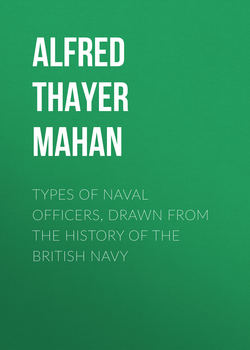Types of Naval Officers, Drawn from the History of the British Navy

Реклама. ООО «ЛитРес», ИНН: 7719571260.
Оглавление
Alfred Thayer Mahan. Types of Naval Officers, Drawn from the History of the British Navy
PREFACE
INTRODUCTORY
HAWKE
RODNEY
HOWE
JERVIS
SAUMAREZ
PELLEW
Отрывок из книги
The recent close of the nineteenth century has familiarized us with the thought that such an epoch tends naturally to provoke an estimate of the advance made in the various spheres of human activity during the period which it terminates. Such a reckoning, however, is not a mere matter of more and less, of comparison between the beginning and the end, regardless of intermediate circumstances. The question involved is one of an historical process, of cause and effect; of an evolution, probably marked, as such series of events commonly are, by certain salient incidents, the way-marks of progress which show the road traversed and the succession of stages through which the past has become the present. Frequently, also, such development associates itself not only with conspicuous events, but with the names of great men, to whom, either by originality of genius or by favoring opportunity, it has fallen to illustrate in action the changes which have a more silent antecedent history in the experience and reflection of mankind.
The development of naval warfare in the eighteenth century, its advance in spirit and methods, is thus exemplified in certain striking events, and yet more impressively is identified with the great names of Hawke and Rodney. The period of nearly half a generation intervened between their births, but they were contemporaries and actors, though to no large extent associates, during the extensive wars that occupied the middle of the century—the War of the Austrian Succession, 1739-1748, and the Seven Years War, 1756-1763. These two conflicts are practically one; the same characteristic jealousies and motives being common to both, as they were also to the period of nominal peace, but scarcely veiled contention, by which they were separated. The difference of age between the two admirals contributed not only to obviate rivalry, by throwing their distinctive activities into different generations, but had, as it were, the effect of prolonging their influence beyond that possible to a single lifetime, thus constituting it into a continuous and fruitful development.
.....
This retrograde movement of Mathews and his division drew the centre away from the van. At about the same time the allied van, composed wholly of French ships, seeing the straits of the Poder and the Real, tacked—turned round—to come down to their assistance. This imposed a like movement upon the British van, lest it should be engaged apart from the rest of the fleet, and perhaps doubled on, by a number of perfectly fresh ships. The Poder, having lost her chief spars, could not be carried off, nor was Hawke able even to remove the men he had thrown on board. She was therefore retaken by the French. Lieutenant Lloyd, the officer in charge, escaped with a part of the prize crew, taking with him also a number of Spanish prisoners; but a junior lieutenant and some seamen were left behind and captured. The Berwick being compelled to follow her division, Lloyd could not rejoin her till the following day, and sought refuge for that night on board another ship.
The next day, February 23d, Mathews had another chance. As he did not pursue during the night, while the allies continued to retire, he was a long way off at daylight; but his fleet was now united, and the enemy retreating. He need therefore have no anxiety about the crippled Marlborough, but could follow freely; whereas, the enemy being pursued, their injured ships both retarded the movement and were endangered. In the course of the day, the Poder had lagged so far behind that Admiral Rowley, who had recognized Hawke's enterprise the day before, directed him to move down upon her. As he approached, the French ship in company abandoned her, but in taking possession Hawke was anticipated by the Essex, which Mathews himself had ordered to do so. The captain of the Essex got hold of the Spanish flag, with some other small trophies, which he afterwards refused to give up unless compelled; and, as Mathews would not give an order, Hawke never got them. Thus curiously it came to pass that the one man who above several misdemeanants distinguished himself by bad conduct, amounting to cowardice, and who ran away to escape trial, kept the tokens of the single achievement of the day from him whose valor had won them. The Poder herself was set on fire, and destroyed.
.....